commentary Commentary
Commentary: The US, China, a security dilemma and a way out in Singapore
If there is any bright spot from this year’s Shangri-La Dialogue, it’s the realisation that a small country like Singapore can play a useful mediating role with rich insights to give the US and China perspective to their relationship, says China commentator Tom McGregor.
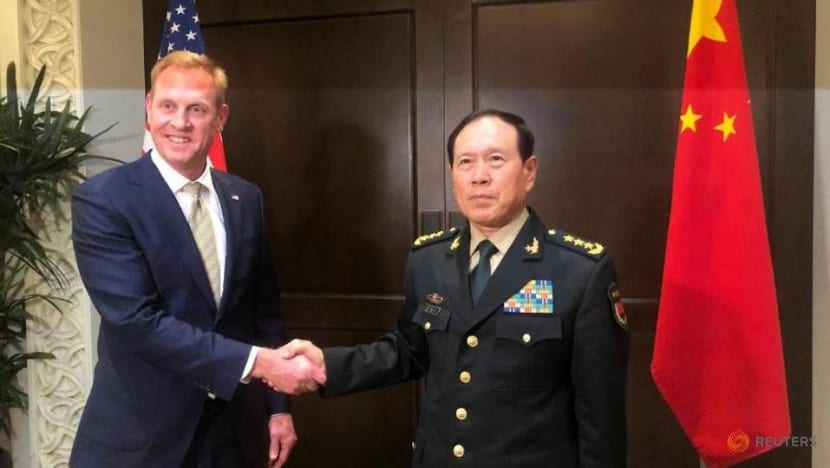
Acting US Defense Secretary Patrick Shanahan and Chinese Defense Minister Wei Fenghe meet before the start of their meeting in Singapore, on the sidelines of the Shangri-La dialogue, on May 31, 2019. (Photo: Reuters/Idrees Ali)
BEIJING: When two elephants fight, an impasse at some point is bound to happen in the ensuring struggle.
This weekend, defence officials from around the world descended upon Singapore to discuss regional security challenges and geopolitics at the Shangri-La Dialogue, an apt time seeing how frictions over the brewing bilateral tussle between the US and China over trade and technology have risen to a fever pitch.
The world’s two richest and most powerful countries were headed for diplomatic confrontation, after the trade truce collapsed last month when Washington raised tariffs from 10 per cent to 25 per cent on listed Chinese imports valued at US$200 billion.
US President doubled down on the pressure on China when he signed an executive order that indirectly labeled the Shenzhen-based telecommunication equipment manufacturer and smartphone maker Huawei and its affiliates a “foreign adversary", clearing the way for barring the company from US networks and manufacturers.
China’s Commerce Ministry responded by raising tariffs on US$60 billion of US imports, blocking US deliveries of LNG and soybeans.
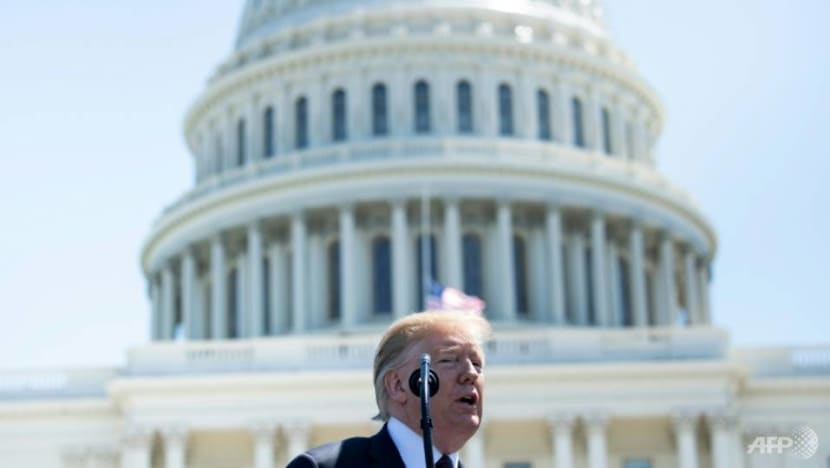
Huawei has repatriated US employees working in Shenzhen and pressed on with a lawsuit against the US government, over earlier charges that the National Defence Authorisation Act passed by Congress in 2018, was unconstitutional.
There are also threats that China will ban certain US companies from operating in the country.
READ: China will not abandon Huawei, a commentary
FIREWORKS IN SINGAPORE
These tensions set the stage for geopolitical fireworks at the Shangri-La Dialogue in Singapore.
US Acting Secretary of Defence Patrick Shanahan and China Defence Minister General Wei Fenghe gave rousing speeches at the conference that raised the temperature, leaving many members in the audience feeling anxious about the growing split between Washington and Beijing.
Although Shanahan shied away from singling out China in most of his speech, he had earlier said before the summit started that he would use his speech to call out China specifically.
So his reference to actors who sought to undermine the rules-based order through militarising disputed areas, predatory economics and influence operations seemed targetted at China.
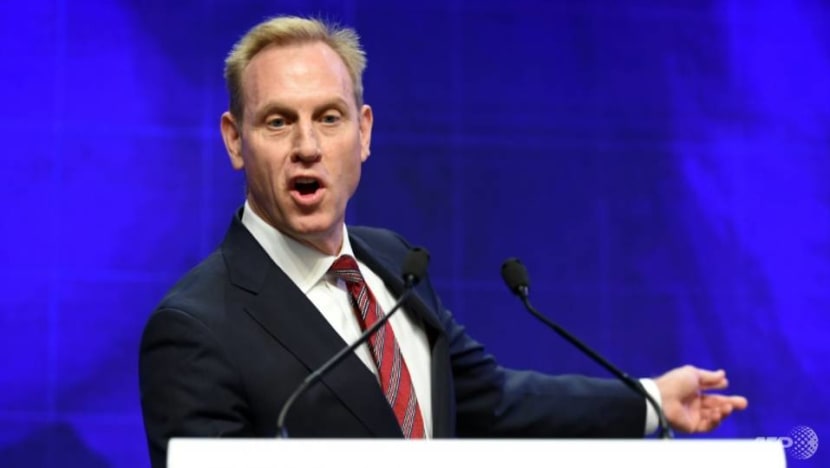
Wei meanwhile highlighted that China will fight until the end, if the US wanted a fight. “Bully us? No way.”
Wei had also send a clear and unequivocal signal regarding Taiwan as a red line in the sand for China. “No attempts to split China will succeed,” he added.
Any interference in the Taiwan question is doomed to failure. If anyone dares to split Taiwan from China, the Chinese military has no choice but to fight at all costs.
“The US is indivisible and so is China. China must be and will be reunified.”
A COMMITMENT TO PEACE
Despite the strong words used by both sides, what went under the radar were the conciliatory remarks in each of their speeches.
China is at an inflection point where its focus is to maintain sustainable and inclusive growth, as it begins to grapple with the challenges of being the world’s fastest ageing country.
While it seeks to defend its interests of preserving a conducive international environment for continued development, it also has to be wary about unnecessarily giving into US demands and setting a precedence inimical to its interests.
There are many in China who believe that the US is out to encircle China through a string of alliances and partnerships with countries around China’s periphery and dampen its rise.
Despite Wei’s pugnacious speech, he also reaffirmed Beijing’s longheld commitment to peace by saying: “China will not attack, unless we are attacked." He also highlighted how both sides should “promote a China-US relationship featuring coordination, cooperation and stability”.
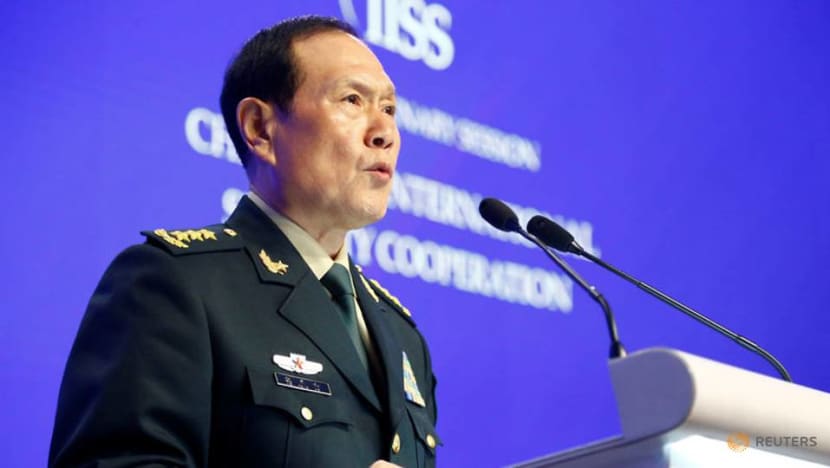
He added:
The two sides realise that conflict, or war between them, would bring disaster to both countries and the world.
Shanahan too highlighted that China has stood with the US as a cooperative partner in pursuit of shared goals in decades past, and both sides have an alignment of interests, “from military-to-military dialogues to develop risk-reduction measures, to tackling transnational threats”.
Both sides also met bilaterally on the sidelines of the Shangri-La Dialogue.
WORRIES REMAIN
Still, Taiwan poses a significant flashpoint for both sides, given Chinese sensitivities over what they perceive as Washington’s meddling in its internal affairs and using Taipei to destabilise peace on the Asian continent, following US National Security Advisor John Bolton’s recent meeting with his Taiwanese counterpart David Lee last week.
A security dilemma is brewing, in which both the US and China take actions and use words to bolster their position, which inevitably ends up making the other feel less secure.
Some Chinese government officials believe the hawkish Bolton best represents US President Donald J Trump’s stance on foreign policy, while Westerners worry hawks in China hold the most influence in Beijing. Both sides are clutching onto misguided viewpoints
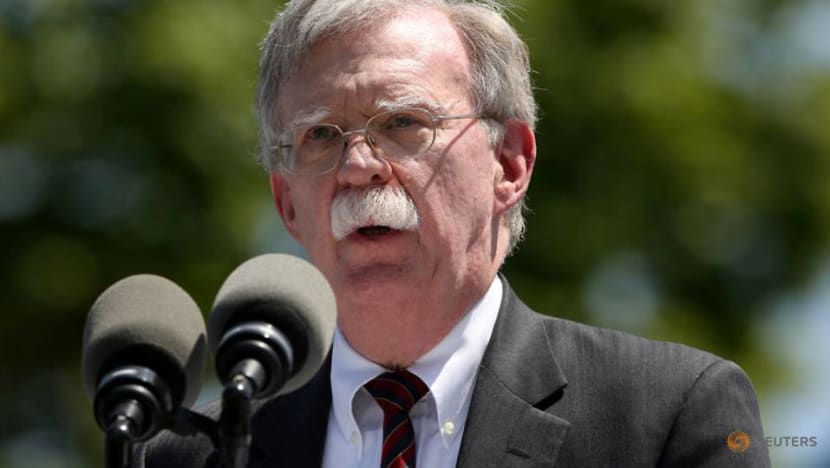
US Defence Secretary Shanahan’s subsequent strong words during his Q&A where he mentioned that China had built artificial island in disputed waters in the South China Sea was also seen as provocative by the Chinese delegation.
READ: A mismanaged US-China relationship could force countries to pick a side, a commentary
THE SEARCH FOR SOLUTIONS
Even when elephants fight, sometimes the grass can make a difference.
Singapore Prime Minister Lee Hsien Loong was spot on when delivering the keynote address at the Shangri-La Dialogue. He said the “fundamental problem between the US and China … is a mutual lack of trust” that “bodes ill for compromise or peaceful accommodation”.
“China’s growth has shifted the strategic balance and the economic centre of gravity of the world ... China has to recognise that it is in a totally new situation created by its own success. It can no longer expect to be treated the same way as in the past when it was much smaller and weaker,” he said.
READ: In full: PM Lee Hsien Loong’s speech at the 2019 Shangri-La Dialogue
At the same time, he highlighted that “the rest of the world too has to adjust to a larger role for China. Countries have to accept that China will continue to grow and strengthen, and that it is neither possible nor wise for them to prevent this from happening”.
President Trump needs to restore trade talks with China, recognise that both sides have got to work together to rebuild trust and strengthen the international global economy, and rein in elements that might wish to take a harsh stance on China for ideological reasons.
Meanwhile, Beijing has to demonstrate it can uphold the principles and standards on trade, technology and intellectual property if President Trump and Chinese President Xi Jinping do sign a US-China trade agreement in Osaka on the sidelines of the G20 and demonstrate good faith in the lead-up to that meeting.
The trade deal can only succeed if both countries follow the rules and guidelines that will be stated in the agreement.
If there is any bright spot from this year’s Shangri-La Dialogue, it’s the realisation that a small country like Singapore can play a useful mediating role between both sides as a neutral observer that has deep and close ties with both the US and China, and rich insights that gives both perspective to their relationship.
The words used by Prime Minister Lee in Singapore has provided a face-saving cover for both sides to step back from the brink and break the impasse. What is needed next is for both to accept compromise and allow for concessions in any upcoming trade negotiations.
Tom McGregor is a commentator on Asia-Pacific affairs based in Beijing.














